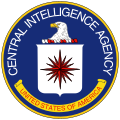Parts of this article (those related to nomination) need to be updated.(April 2020) |
 Seal of the Central Intelligence Agency | |
| Agency overview | |
|---|---|
| Formed | 1952 |
| Jurisdiction | United States |
| Headquarters | George Bush Center for Intelligence, Langley, Fairfax County, Virginia |
| Agency executive |
|
| Parent agency | Central Intelligence Agency |
| Website | Official website |
The Office of Inspector General (often abbreviated to OIG) of the United States Central Intelligence Agency (CIA) is the independent overseer of the organisation. Since 2024, the office has been held by Robert Host. The first inspector general was appointed in 1952. [1] The Central Intelligence Agency Office of Inspector General has worked on cases in collaboration with the United States Department of Justice and the National Security Agency Office of Inspector General. [2]